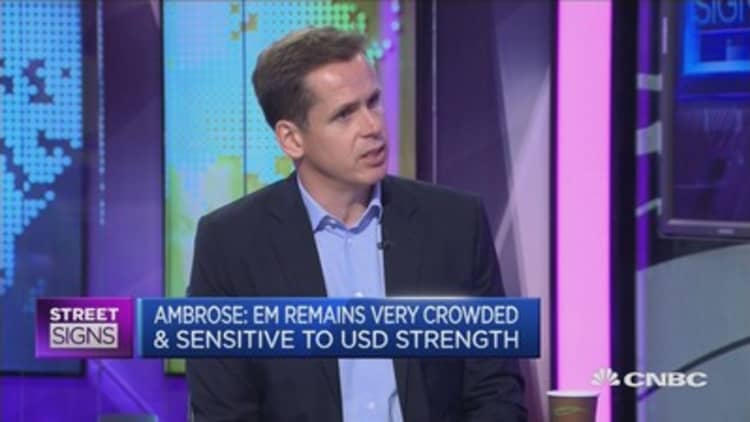
With the U.S. and Brazil beset by political turmoil and Chinese stocks on the downswing, the big trade of 2017 increasingly looks like a rotation to Europe.
Cash already has been flocking across the Atlantic this year. Investors have moved $13.7 billion to European funds, with the past week's allocation of $6 billion the highest one-week flow on record, according to Bank of America Merrill Lynch.
There are multiple factors driving the move.
Most recently, the victory of Emmanuel Macron in the French presidential election brought assurance that the political far-right faction led by Marine Le Pen would not be allowed to be a significantly disruptive factor.
Other longer-term factors include cheaper valuations for European stocks than their U.S. counterparts and an economy that is on the move. Meanwhile, the biggest domestic stock market sell-off of the year on Wednesday sparked fears about what will happen if President Donald Trump's pro-growth agenda stalls under a cloud of investigations.
"The fundamental backdrop continues to support a positive stance on the European market," Ronan Carr, European equity strategist at BofAML, said in a recent note. "The earnings backdrop is very strong including evidence of strong operating leverage in Europe, broad-based positive momentum in revisions, the best earnings season in 15 years and further upside to expectations implied by leading indicators."
Carr likes banks and commodities and is shying away from utilities and food. He is warning that a near-term pullback might be in store as most European indexes are up strongly in recent days and could be overheating a bit.
However, after a year in which the region's stocks performed poorly and some $103 billion left Europe-focused funds, there appears to be plenty of room to the upside.
Money inflow could be just starting
"We've got a lot of positives," Pierre Lagrange, senior advisor at Man Group, told CNBC. "You have growth that's actually picking up, you have confidence that we haven't had for a very, very long time in mainland Europe. We can't forget how close we were to an absolute disaster."
Indeed, the French election came just as the wounds were healing from last year's Brexit vote and a general fear that the euro zone was breaking up just as the economy was starting to recover.
The recent flow of funds to the region shows investor confidence is coming back, and could be in at most its middle stages. After all, the $6.9 billion that has flowed to Europe exchange-traded funds is less than half what left last year, when most of the outflows came from actively managed mutual funds.
Carr believes "significant potential upside remains" should active and passive funds reclaim anywhere close to what they lost in flows last year.
"The bull market in European equities is in full swing," he said.
ETFs tracking European indexes are having a big year.
Both the Vanguard FTSE Europe Index Fund ETF Shares and the country-focused iShares MSCI Germany ETF are up 15.5 percent in 2017. The U.K.-focused FTSE 100 index has risen nearly 22 percent.
Still, European stocks are relatively cheap, trading at 15.4 times earnings compared with nearly 18 times in the U.S. They've also outperformed domestic shares, with European indexes collectively up around 11 percent compared with the 5.5 percent rise in the .
"The plausible bull case for Europe is that it can trade back up to those valuation levels based on falling political risk, a genuine earnings recovery and recovering inflows," Carr said.
The key economic metric of productivity also is moving at a faster pace in Europe than the U.S. — about 1.1 percent to 0.2 percent.
Finally, fund managers surveyed this month by BofAML believe the U.S. is the most overvalued region in the world. Conversely, the euro zone is seen as one of the world's most undervalued regions.
The managers have increased their allocation to U.K. equities, with underweight positions falling from a net 34 percent in April to 27 percent in May.
Watch: Europe, by far, our favorite market



